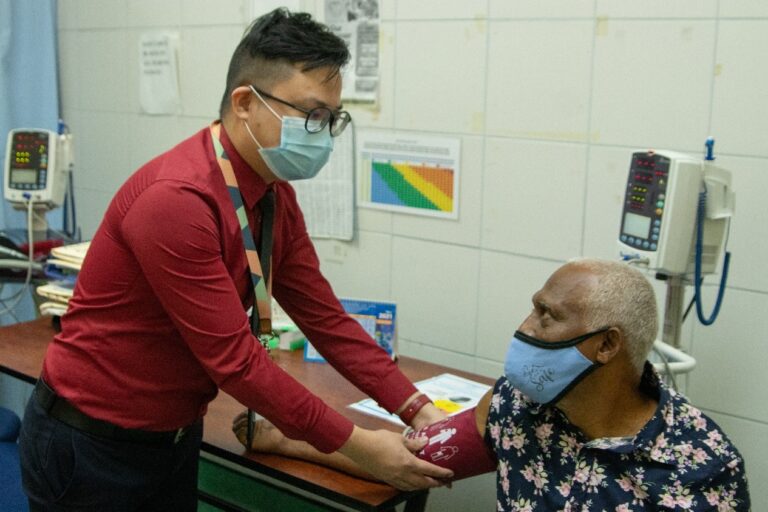 Siparia Health Centre, Trinidad and Tobago, May 2021. ©PAHO/WHO/Denith McNicolls
Siparia Health Centre, Trinidad and Tobago, May 2021. ©PAHO/WHO/Denith McNicolls
Trinidad and Tobago, like many countries around the world, faces a growing burden of non-communicable diseases (NCDs) such as heart disease, stroke, cancer, diabetes and chronic lung diseases. These chronic diseases are responsible for more than 62% of deaths each year, three-quarters of which occur in people under the age of 70. More than half of the country’s population has 3 or more risk factors, such as poor diet, physical inactivity and harmful use of alcohol and tobacco, putting them at greater risk of developing chronic disease. The country’s experience shows that empowering communities to take charge of their health through the prevention and self-management of chronic diseases is an effective way to build healthier populations and ensure health for all.
Dr Michael Jaggernauth, a primary health care doctor working at the South West Regional Health Authority in Trinidad, suffers from diabetes. Although he was a medical professional, he struggled to maintain and manage his own health. It’s very common. Even though people know, in theory, that adequate physical activity and a healthy diet are important, they struggle to make the lifestyle changes needed to improve their health.
However, Dr. Jaggerauth participated in training that changed his perspective. This was the chronic disease self-management course, implemented by PAHO/WHO, with the support of the Partnership for Universal Health Coverage (CHU Partnership).
“Chronic illnesses cause fatigue, poor sleep and physical limitations. This program has given me many more tools to work with and I am seeing a marked improvement in my health. I sleep better, exercise better, and my weight is better controlled.
Having realized the benefits of the program, I see myself as an advocate or mentor to others with chronic illnesses who may be struggling to manage their illness. I would like to help train them and the community at large so that more people can benefit. This will expand and diseases will become less of a problem for the population,” said Dr Jaggernauth.
Communities empowered to improve their health
Dr Jaggernauth was one of 25 people with NCDs, from various state and non-state organizations in Trinidad and Tobago, who attended this training to both manage their own NCDs and also become ‘Master Trainers » in their communities. This community-based approach increased people’s knowledge, skills and confidence to care for themselves and manage their illness effectively.
The Ministry of Health, in collaboration with PAHO/WHO, designed the program to ensure that community members are empowered and support each other to make healthy lifestyle choices and manage their own noncommunicable diseases. This approach is also integrated into the health system so that people can receive the appropriate support when needed. Over time, the initiative will be expanded nationally, with a plan to train more leader trainers over the next two years to reach all communities.
Achieving health for all through universal health coverage starts with communities being empowered to improve and protect their health. Trinidad and Tobago is one of 115 countries and regions to which the CSU Partnership helps provide WHO support and technical expertise to advance universal health coverage (UHC) with a primary health care (PHC) approach. The Partnership for UHC is one of WHO’s largest initiatives in international cooperation for UHC and PHC. It is funded by the European Union, the Grand Duchy of Luxembourg, Irish Aid, the French Ministry of Europe and Foreign Affairs, the Government of Japan – Ministry of Health, Labor and Social Protection, the United Kingdom – Foreign, Commonwealth and Development Office, Belgium, Canada and Germany.
